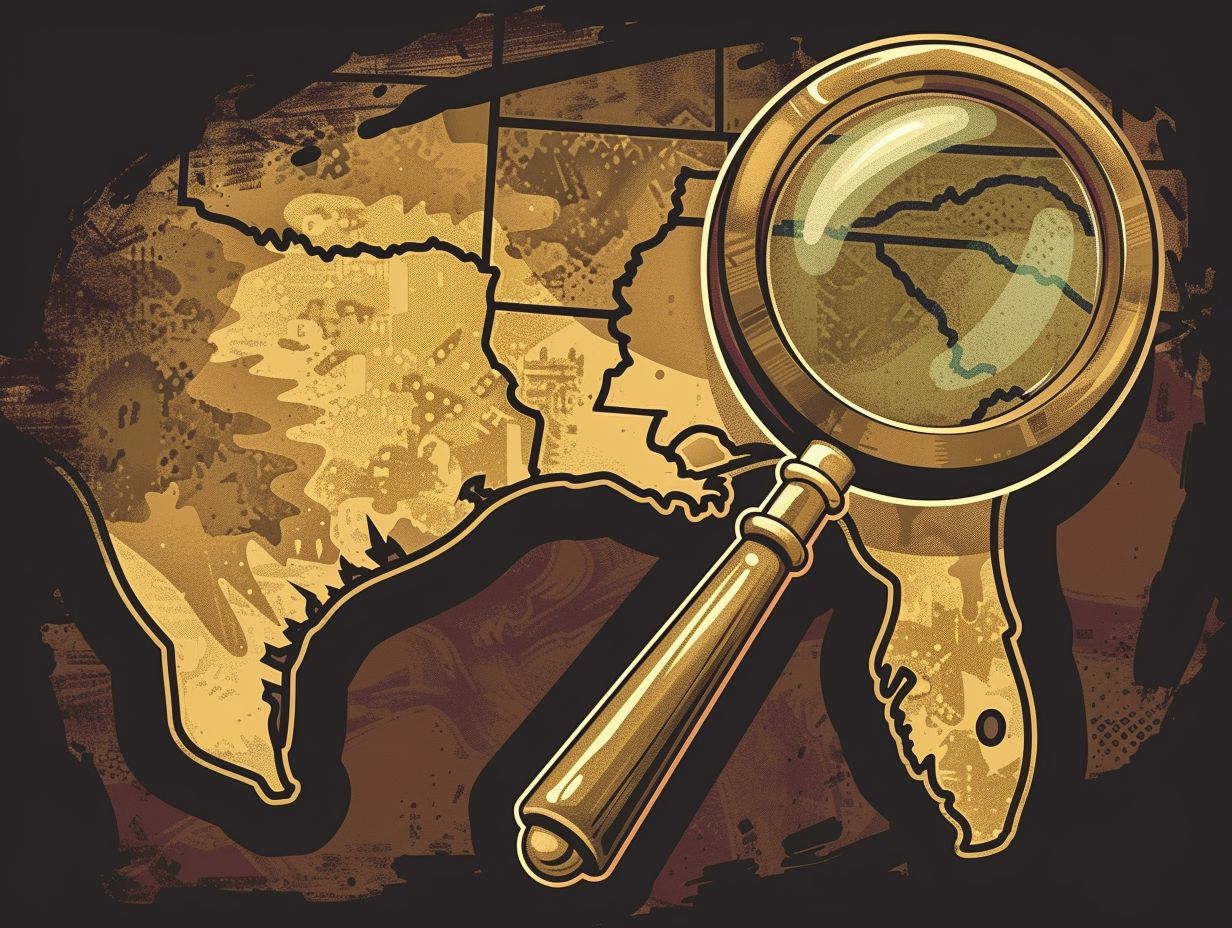Becoming a detective in Texas can be a rewarding and challenging career path for you. It’s going to take a mix of education, training, experience, and specific skills to reach that goal. You’ve got to meet the basic requirements and go through a series of steps to apply for a detective position.
Let’s dive into the requirements, steps, skills, salary, job outlook, and duties of a detective in Texas. Whether you’re into law enforcement or aiming to climb the career ladder, this guide will give you some useful insights into the realm of detective work.
What are the Requirements to Become a Detective in Texas?

If you’re dreaming of becoming a detective in Texas, you’ll need to check off some specific boxes set by the Texas Department of Public Safety. They’ve got a list of requirements that include things like educational qualifications, relevant experience, and certification.
To snag that detective role in Texas, you’ll typically need at least a high school diploma or GED. But hey, a lot of agencies prefer candidates with a bachelor’s degree in criminal justice or a related field. Having some prior experience in law enforcement or investigative work is a big plus too – many detectives start off as police officers. And don’t forget about getting certified, like scoring that Texas Commission on Law Enforcement (TCOLE) certification. The Texas Department of Public Safety is the big boss in charge of the selection process, handling background checks, interviews, and other assessments to make sure you’re up to snuff for the detective gig in the Lone Star State.
1. Education and Training
Your journey to becoming a detective in Texas starts with getting the right education and training in fields like criminal justice and law enforcement. You’ll dive into understanding criminal behavior and psychology, which are key aspects of this training.
To kick off your career as a detective in Texas, you’d typically kick things off by snagging a Bachelor’s degree in criminal justice or a related field. This educational background sets you up with a solid grasp of the legal system, investigative techniques, and forensic science. Taking specialized courses that focus on criminal behavior and psychology gives you valuable insights into how perpetrators think, which can be a game-changer when cracking tough cases.
Getting practical experience through internships or starting off in entry-level roles at law enforcement agencies will give your skill set an extra boost. This hands-on experience will help you get ready for the challenges that come with detective work in Texas.
2. Experience
In your journey to becoming a detective in Texas, experience is key. Getting hands-on with criminal cases, surveillance, and evidence collection is where the real learning happens.
When you’re out there in the field, not only do you sharpen your investigative skills, but you also get to flex your critical thinking muscles and make quick decisions on the fly. It’s all about getting that firsthand knowledge of how to gather evidence, decode clues, and piece together those intricate puzzles that crack cases wide open. Being able to adapt to whatever comes your way and think fast are crucial skills in detective work, and the best way to develop and refine these skills is through practical experience.
3. Physical Requirements
As someone aspiring to be a detective in Texas, you must meet specific physical requirements, which include fitness standards and firearm training. It’s also crucial for you to be familiar with state regulations and jurisdictional limits.
Your physical fitness is vital for your success as a detective. You’ll need to keep up your endurance and stamina to tackle the demands of the job effectively. Additionally, firearm training is a must to make sure you’re ready to handle any potentially dangerous situations that may arise.
It’s essential to follow state regulations and jurisdictional rules to maintain the integrity of investigations and ensure that all procedures are correctly adhered to. By meeting these requirements, you’ll be fully equipped to take on the challenges that come with being a detective in Texas.
4. Background Check and Drug Test
When you’re gunning to be a detective in Texas, get ready for the whole shebang – background checks and drug tests all the way. It’s not just about ticking boxes; showing that you’ve got the integrity and slick surveillance skills is key.
This whole process isn’t just about keeping the law enforcement agency on the up and up. It’s also about making sure the public’s trust in detectives stays rock-solid. By digging into a candidate’s background – think criminal records and professional behavior – the department can really suss out who’s fit to champion justice and fairness.
And let’s not forget drug testing. That’s not just about ticking another box; it’s about keeping the task force sharp and focused. That’s crucial for making those split-second calls in high-pressure moments. Mix in ethical standards and top-notch sleuthing skills, and you’ve got detectives who can handle any twisty case both professionally and ethically.
5. Age and Citizenship
To become a detective in Texas, you’ve got to meet some specific age and citizenship requirements. These rules are in place to make sure you’re all legal and good to go for the job.
In the Lone Star State, if you’re looking to snag that detective badge, you’ve gotta be at least 21 years old and a U.S. citizen. These requirements are there to maintain the integrity and credibility of law enforcement. By having age and citizenship standards, Texas ensures that only folks with the right maturity and dedication can handle the duties that come with being a detective. Following these guidelines is key to keeping the detective squad in Texas top-notch and effective.
What are the Steps to Becoming a Detective in Texas?
If you’re thinking about becoming a detective in Texas, get ready to follow a structured roadmap laid out by law enforcement agencies and the Texas Department of Public Safety. These steps are there to help you navigate the process smoothly.
First things first – make sure you meet the basic requirements. That usually means being 21 years old, having a high school diploma or GED, and being a U.S. citizen or legal resident.
Then comes the application process. Get ready for a thorough background check, a written exam, and maybe even some physical fitness tests.
Once you’ve aced those steps, you might need to go through formal training at a recognized law enforcement academy. And getting some hands-on experience in law enforcement or related fields can give you a leg up on your path to becoming a detective.
1. Meet the Basic Requirements
If you want to become a detective in Texas, the first thing you need to do is meet the basic requirements laid out by law enforcement agencies. Showing that you’ve got what it takes and a real passion for sleuthing is key at this point.
If you’re looking to dive into the world of detective work, you’ve got to have a solid grasp of law enforcement practices. This could come from relevant academic qualifications or past experience in the field. Paying attention to details, thinking critically, and being able to untangle complex situations are all essential skills for anyone aiming to make it in this challenging profession.
Having a sharp eye for detail and the ability to communicate your findings clearly are crucial parts of being a detective. This highlights the importance of sharpening your investigative skills right from the start of your detective career journey.
2. Apply to a Law Enforcement Agency

Once you’ve got all the basic requirements in check, you’re ready to take the next step towards becoming a detective in Texas. That means it’s time to start applying to reputable law enforcement agencies. Get those necessary documents and certifications in order, and submit them for consideration.
Before you hit send on those applications, make sure you dive into the specific requirements of each agency you’re interested in. They might have some slight differences in what they’re looking for. You’ll want to gather up proof of your education, work history, and any relevant training or courses you’ve taken. And don’t forget about certifications like peace officer licenses or specialized investigative training – they can really boost your application.
Make sure all your paperwork is squared away and accurate. Even the smallest mistake or missing detail could cause a snag in the application process. Some agencies might even require you to go through background checks and interviews before they make their final decision. So, get those documents organized and polished to give yourself the best shot at landing that detective gig.
3. Complete the Academy Training
When you’re on the path to becoming a detective in Texas, academy training is a must. Completing structured programs in law enforcement degrees or criminal justice sets you up for a well-rounded training experience.
As you dive into the coursework, you’ll not only soak up theoretical knowledge but also hone practical skills that are vital for navigating intricate investigative processes. These programs go deep into specialized areas like forensics, criminal law, and critical thinking, all crucial for handling the real deal out in the field. By running through different scenarios and getting hands-on with exercises, you’ll be well-prepped to tackle the nitty-gritty of crime scene analysis, evidence collection, and interrogation techniques. It’s all about getting you ready to face the challenges of criminal investigations head-on once you’ve got that diploma in hand.
4. Gain Experience as a Police Officer
Building experience as a police officer is a crucial step in your journey towards becoming a detective in Texas. You need to understand criminal behavior and gain practical insights into law enforcement at this stage.
By immersing yourself in various cases and situations, you’ll develop a keen eye for detail and a deep understanding of criminal psychology. The skills you hone during patrol work, like communication, observation, and quick decision-making, will set a solid foundation for more intricate investigative tasks.
Interacting with diverse communities can broaden your perspective and enhance your interpersonal skills, which are essential for building trust and gathering information as a detective.
5. Apply for a Detective Position
Once you’ve gained the necessary experience, it’s time to set your sights on becoming a detective in a Texas law enforcement agency. This move is a big deal and a major step forward in your career journey.
Becoming a detective isn’t a walk in the park. You’ll have to go through a series of tough assessments and evaluations to prove that you’ve got what it takes for the job. This could mean written tests, interviews that’ll have you sweating, and even some physical fitness challenges.
On top of that, you’ll need to spill all the beans about your background, undergo thorough checks, and show off your investigative skills. But once you secure that detective position, it’s not just a pat on the back – it’s an opportunity to level up with specialized training and more chances to advance in the law enforcement field.
What Skills and Qualities are Needed to Become a Detective in Texas?
To become a successful detective in Texas, you’ll need to have a diverse skill set and specific qualities. Strong communication skills, critical thinking, problem-solving abilities, keen observation, teamwork, and ethical conduct are all key components of being a competent detective.
Regarding effective communication skills, they’re super important for a detective’s daily interactions with colleagues, witnesses, victims, and suspects. Being able to clearly explain findings, listen well, and work together effectively really boosts the investigative process. Critical thinking is another crucial skill that helps detectives analyze complex situations, spot patterns, and draw logical conclusions. Using problem-solving techniques is handy for navigating tough cases, adapting to surprises, and coming up with new approaches to crack crimes. Being a team player is a big plus too since it encourages cooperation, sharing resources, and bringing in diverse viewpoints that can lead to solving cases successfully. And of course, maintaining ethical conduct is essential to keep things honest, fair, and following legal procedures in all your investigative work.
1. Critical Thinking and Problem-Solving Skills
In Texas, if you want to be a detective, you’ve got to have some serious critical thinking and problem-solving chops. These are the superpowers that help you crack cases, use forensic tools, and untangle tricky mysteries.
When you sharpen your critical thinking skills, you become a pro at sifting through evidence, spotting hidden clues, and piecing together those mind-boggling crime scenes. And those problem-solving skills? They’re your secret weapon for cutting through the noise, spotting patterns, and reaching those aha moments.
As a detective, you’ll rely on these skills big time when you’re grilling suspects, figuring out their motives, and weaving together a story that solves the case. But it’s not just about solving crimes – your critical thinking and problem-solving skills also come in handy for preventing future incidents and making sure justice is served.
2. Strong Communication and Interpersonal Skills
When you’re a detective in Texas, having top-notch communication skills is key. Whether you’re chatting with suspects or conducting interrogations, being able to communicate clearly and connect with others is crucial for getting the job done right.
Your ability to communicate well isn’t just important for getting info out of suspects and witnesses. It’s also vital for building trust and solid relationships throughout the investigation process. Detectives like you depend on your communication skills to handle tricky situations, defuse conflicts, and gather all the necessary details to crack a case wide open. By sharpening your interpersonal skills, you can smoothly work with a variety of people and team up with other law enforcement agencies. This teamwork boosts the effectiveness and accuracy of your investigations, making sure you’re on top of your game.
3. Attention to Detail and Observation Skills
In Texas, as a detective, you need to have keen attention to detail and sharp observation skills. These are crucial for every step of the investigative process, from collecting evidence to analyzing crime scenes. By honing these skills, you ensure that your investigations are thorough and your conclusions are accurate.
Your sharp eye for detail allows you to pick up on subtle clues that others might miss, leading to breakthroughs in even the most complex cases. By meticulously documenting every aspect of a case, you can reconstruct events with precision, piece together timelines, and identify patterns that are essential for connecting the dots.
Observing body language, nuances in behavior, and environmental factors can offer valuable insights into suspects, motives, and potential leads. Your ability to observe, interpret, and document meticulously can truly make a difference in bringing justice to victims and holding perpetrators accountable.
4. Physical and Mental Resilience

In Texas, you need to have some serious physical and mental grit to make it as a detective. Keeping yourself in top shape and finding ways to manage stress effectively are key to thriving in those tough investigative situations.
When you’ve got solid physical endurance, you can tackle all kinds of demanding tasks, whether it’s chasing down suspects on foot or navigating obstacles during operations. And let’s not forget about mental toughness – that’s what helps you stay sharp and focused when everything around you is chaotic and uncertain.
By sharpening these skills, you’ll be better equipped to handle the pressure of cracking those tough cases and making those split-second decisions. Building up a resilient mindset will help you bounce back from setbacks and deal with emotionally draining situations calmly, which will not only boost your job performance but also keep you feeling good overall.
What is the Salary and Job Outlook for Detectives in Texas?
If you’re thinking about becoming a detective in Texas, it’s important to know what the salary and job prospects look like in the Lone Star State. Texas offers competitive pay and bright career opportunities for detectives like you.
As a detective in Texas, you can expect to bring in anywhere from $60,000 to $100,000 a year, depending on things like your experience, where you work, and what areas you specialize in. The job outlook for detectives in Texas is looking pretty rosy, with steady growth on the horizon. This means there are plenty of chances for you to move up the career ladder and grow professionally. With a high demand for skilled investigators in a range of industries, Texas is a great place to kickstart a successful career in detective work.
1. Average Salary for Detectives in Texas
If you’re considering becoming a detective in Texas, you’re in for a treat when it comes to compensation. You can look forward to competitive salary packages that match your skills and experience in the field.
As a detective in Texas, your annual salary can vary between $50,000 and $120,000. Factors like your education level, years of experience, and specialization area all play a role in determining where you fall on that spectrum. The Lone Star State doesn’t just offer great BBQ – it also provides opportunities for career growth, with higher salary potential as you climb the ladder. On top of your base salary, perks like health insurance, retirement plans, and paid time off sweeten the deal, giving you not just financial rewards, but also stability and security in your career.
2. Job Outlook for Detectives in Texas
If you’re considering a career as a detective in Texas, you’re in luck! There are plenty of job openings waiting for you in various law enforcement agencies across the state. Get ready for a promising job market and a whole range of professional growth opportunities.
In Texas, law enforcement agencies offer a diverse array of specializations within detective work. You could find yourself working on anything from homicide investigations to financial crimes. And here’s the exciting part – detectives in Texas get to team up with federal agencies like the FBI and DEA, which can really amp up their skills and experience. Plus, with the state’s population and economy on the rise, the demand for talented detectives is expected to soar. That means you’ll have tons of chances to advance your career and specialize in hot areas like cybercrime and counterterrorism.
What are the Duties and Responsibilities of a Detective in Texas?
Understanding the core duties and responsibilities of a detective in Texas gives you a peek into the many sides of the job. From digging into crimes to getting involved in courtroom stuff, detectives are the unsung heroes of keeping the peace.
Your job as a detective involves a lot of investigating – collecting evidence, talking to witnesses, crunching data, and following up on leads to crack those tough cases. You’re the one in charge of handling and safeguarding evidence, making sure it holds up in court for a successful prosecution. When it’s time for court, you present your findings, give testimony, and team up with legal folks to build a solid case. Following all the right procedures, you’ve got to document every step of your investigation, stick to chain of custody rules, and always stay true to those ethical standards along the way.
1. Investigating Crimes and Gathering Evidence
Your job as a detective in Texas is to get down and dirty investigating crimes and pulling together all the important evidence. It’s all about preserving that crime scene and handling evidence like a pro – that’s the key to cracking those criminal cases.
When you’re on the case as a detective in Texas, you’ve got to follow a step-by-step method for digging into those investigations. It all kicks off with making sure every little detail at the crime scene is carefully documented. You’ve got to be super careful when collecting and preserving physical evidence like DNA samples, fingerprints, and other forensic goodies. And don’t forget those specialized techniques to keep everything squeaky clean and avoid any contamination. By keeping a tight grip on the chain of custody for all that evidence, you’re setting yourself up for success in court. Team up with those forensic pros, bring in the latest tech gear, and dive deep into analyzing the evidence – that’s how you uncover the juicy nuggets that crack open even the toughest cases.
2. Interviewing Witnesses and Suspects
When you’re playing detective in Texas, interviewing witnesses and suspects is key to cracking the case. Getting those witness accounts spot-on and handling interrogations like a pro are essential for solving mysteries.
Witnesses hold the keys to unlocking crucial insights that guide investigations, providing valuable clues and fresh perspectives. Skilled detectives down in Texas know their interrogation game, using tricks like building rapport, reading body language, and asking the right questions to dig out important details.
Customizing investigative tactics for each case is crucial for a thorough and unbiased approach, pinpointing key leads and evidence. By mastering the art of interviewing witnesses and suspects, you can unravel the truth and serve justice to those tangled up in criminal activities.
3. Writing Reports and Testifying in Court
When you’re a detective in Texas, documenting case details through comprehensive reports and testifying in court proceedings are key parts of the job. To really shine in the criminal justice system, you’ve got to be on top of courtroom procedures and legal research.
As you go about documenting evidence and findings, remember that you’re the one painting the picture of the crime for the court. Your reports are like gold for prosecutors, defense attorneys, and judges – they rely on your work to understand all the ins and outs of the case.
And when it’s time to take the stand, you’ve got to communicate your observations and analysis clearly. Stick to courtroom etiquette and decorum, and make sure your legal research is spot-on. This way, your testimony will line up perfectly with the laws and regulations, making the case presented in court even stronger.
4. Collaborating with Other Law Enforcement Agencies

In Texas, as a detective, you know that teaming up with various law enforcement agencies is a big part of your gig. When you work together and coordinate effectively with other agencies, it really amps up the investigative game and boosts overall law enforcement efforts.
When you team up and share info with other agencies, that’s when the magic happens. It’s all about cracking those tough cases that span across different jurisdictions. By collaborating with a mix of agencies, you get access to a whole range of expertise, resources, and viewpoints. This way, you can tackle investigations from all sorts of angles.
Teaming up also means pooling your resources, so you can respond faster to emergencies and allocate personnel more efficiently based on what a case needs. When you work with a variety of agencies, you build a vibe of backing each other up and trust. It’s like creating a united front against crime in the state.
Frequently Asked Questions
What are the requirements to become a detective in Texas?
In Texas, the requirements to become a detective include being a U.S. citizen, at least 21 years old, possessing a valid driver’s license, and having a high school diploma or GED. Some agencies may also require a college degree or prior law enforcement experience.
How do I apply to become a detective in Texas?
To become a detective in Texas, you must first become a police officer and gain experience in the field. Once you meet the eligibility requirements, you can apply for detective positions within law enforcement agencies. You may also need to pass a written exam and undergo a background check.
What training is required to become a detective in Texas?
Plus basic police academy training, detectives in Texas must complete specialized training in areas such as investigation techniques, evidence collection, and criminal law. This training can vary based on the specific agency and position.
What is the salary range for detectives in Texas?
The salary for detectives in Texas can vary depending on the agency and location. According to the U.S. Bureau of Labor Statistics, the average annual salary for detectives and criminal investigators in Texas is around $69,500.
Do I need to have a specific degree to become a detective in Texas?
While a college degree is not always required to become a detective in Texas, having a degree in criminal justice or a related field can be beneficial. It can also make you a more competitive candidate for open positions.
What qualities are important for a detective in Texas?
Some important qualities for a detective in Texas include strong communication skills, attention to detail, critical thinking abilities, and physical and emotional stamina. Detectives also need to have a strong sense of integrity and be able to handle high-pressure situations effectively.

